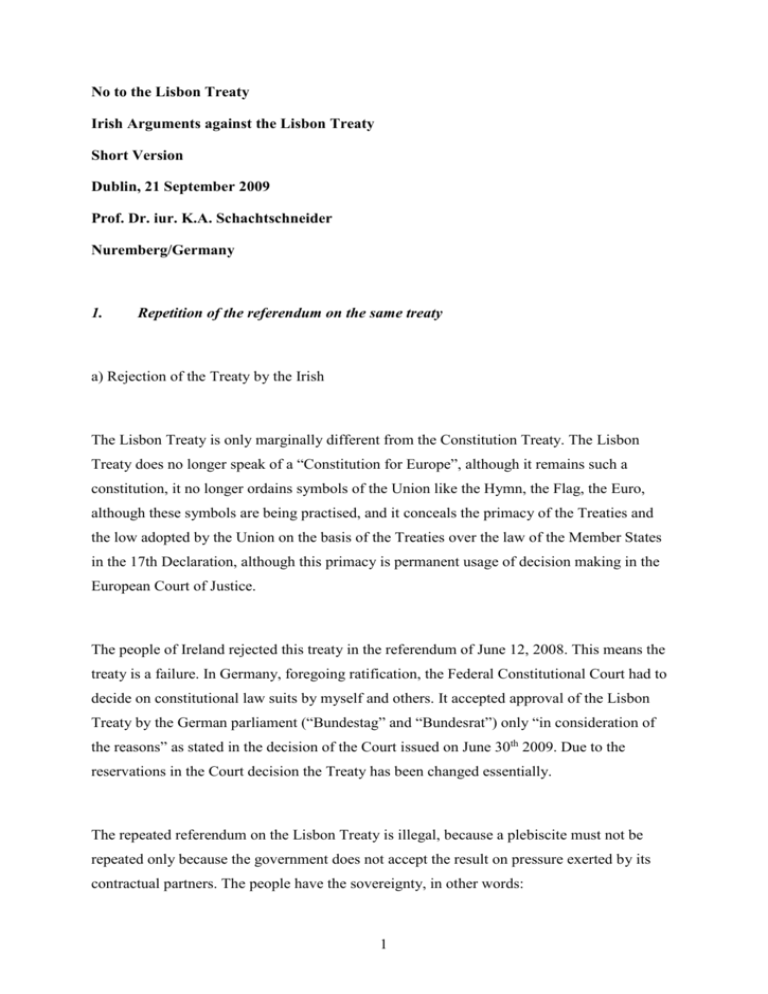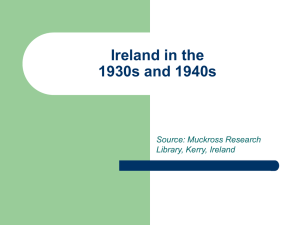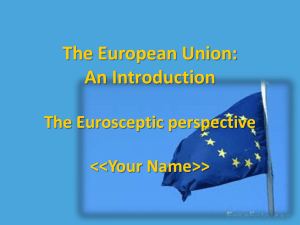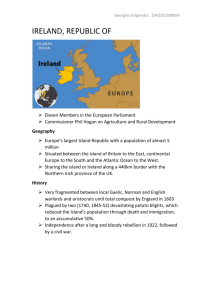No to the Lisbon Treaty
advertisement

No to the Lisbon Treaty
Irish Arguments against the Lisbon Treaty
Short Version
Dublin, 21 September 2009
Prof. Dr. iur. K.A. Schachtschneider
Nuremberg/Germany
1.
Repetition of the referendum on the same treaty
a) Rejection of the Treaty by the Irish
The Lisbon Treaty is only marginally different from the Constitution Treaty. The Lisbon
Treaty does no longer speak of a “Constitution for Europe”, although it remains such a
constitution, it no longer ordains symbols of the Union like the Hymn, the Flag, the Euro,
although these symbols are being practised, and it conceals the primacy of the Treaties and
the low adopted by the Union on the basis of the Treaties over the law of the Member States
in the 17th Declaration, although this primacy is permanent usage of decision making in the
European Court of Justice.
The people of Ireland rejected this treaty in the referendum of June 12, 2008. This means the
treaty is a failure. In Germany, foregoing ratification, the Federal Constitutional Court had to
decide on constitutional law suits by myself and others. It accepted approval of the Lisbon
Treaty by the German parliament (“Bundestag” and “Bundesrat”) only “in consideration of
the reasons” as stated in the decision of the Court issued on June 30th 2009. Due to the
reservations in the Court decision the Treaty has been changed essentially.
The repeated referendum on the Lisbon Treaty is illegal, because a plebiscite must not be
repeated only because the government does not accept the result on pressure exerted by its
contractual partners. The people have the sovereignty, in other words:
1
The people are sovereign, not the government, not the parliament. All people in Europe
thinking in terms of freedom and justice are enraged that Ireland is forced to repeat its
referendum. For this fact alone all Irish people should vote NO.
2) Dubious Concessions to Ireland
Neither the concessions of the heads of state or government of June 18/19th 2009 nor a
protocol of the same content do change the Lisbon Treaty in any way, neither formally nor
materially.
a)
The number of the commissioners was not fixed in a mandatory way.
b)
According to Section A of the Conclusion the provisions of the Treaty should not
affect the applicability of the protection of the rights to life, protection of the family and the
protection of the rights in respect rights of education providing by the Constitution of
Ireland.” This Conclusion does not grant anything which is not valid anyway. The Irish
people are being deceived if something else is pretended. The validity of the national
constitutions and laws is not affected by the laws of the Union. The validity of the national
constitutions and legislations is not affected by Union legislation. The terms which are
decisive are “scope” and “applicability”. The applicability of Union Law has primacy. The
Irish protection of fundamental rights opposed to the Treaties and legislation of the Union will
be lost
c) According to section B of the Conclusion the Lisbon Treaty “nothing makes any change of
any kind for any Member State to the extent or operation of the competences of the European
Union in relation to taxation”. Once again the Irish are told that their sovereignty will be
respected although in fact nothing is being conceded or altered. The Treaty clearly rules in
article 311 paragraph 3 sentence 2 (TFEU) that the EU Council may decide unanimously on
“new categories of own resources” of he Union, meaning also taxes. Thereby the tax
competences in the member states are not affected, but it paves the way for additional taxation
by the European Union. By the way, according to Art. 269, paragraph 2 EVG, the Council
could decide on the equity capital also before now.
2
d) Also section C (security and defence) does not change the Lisbon Treaty and does not
justify a new referendum in Ireland. It states: “The Treaty of Lisbon does not affect or
prejudice Ireland’s traditional policy of military neutrality”. This is made clear in article 42,
paragraph 2, subparagraph 2, sentence 1, TEU and is repeated in paragraph 7, sentence 2
ruling the obligation for assistance if an armed attack strikes the sovereign territory of a
member state. Ireland has to agree to a common defence by referendum. But what does the
neutrality clause mean in reality?
The Constitution Treaty establishes a military Union power which to develop and strengthen
becomes an obligation of the member states (art. 42 par. 3 TEU). “The Member States shall
undertake progressively to improve their military capabilities” (Subpar. 2 s. 1). For this
purpose there is the European Defence Agency (Subpar 2 s. 2). This also applies to Ireland.
Part of the common security and defence Policies are “the missions outside of the Union for
peace-keeping, conflict-prevention and strengthening of international security in accordance
with the principles of the Charter of the United Nations” (art. 42 par. 1 TEU). The term
“terrorism” is nowhere defined and unclear. The Union empowers itself for Combating
against Terrorism also in third countries (art. 43 par. 1 s. 2 TEU). With “terrorism” the
marching into a third country and its occupation may be justified. These are regarded as
“tasks of combat forces in crisis management, including peace-making and post-conflict
stabilisation.” (art. 43 par. 1 s. 1 TEU). With the authorization for missions the Union gives
itself the right for making wars (ius ad bellum) which cannot be justified with the purposes as
stated here. The prohibition of the usage of force is a foundation pillar of modern international
law (art. 2 par. 1 UN-Charter). Interventions are prohibited, also the humane intervention.
World peace only justifies the use of military forces in case this is resolved by the UN
Security Council (art. 42 UN-Charter).
Such missions do not at all affect the principle of neutrality, because they are no wars between
states according to the traditions of international law, in particular international law of war.
The so-called Irish clause does not apply. Nevertheless they are wars, modern or nonsymmetrical wars. The EU of the Lisbon Treaty is arming for war. It is not an organ of peace.
Ireland will not be able to escape from war. The EU is about to establish itself as global or
great power beside the United States of America. Thus the obligation for peace
3
(“Friedensparadigma”) which is being spread everywhere as the most important justification
of EU integration is abandoned.
II Arguments against the Treaty
1. The Lisbon Treaty is incompatible with the Constitution of the Republic of Ireland. It
infringes the irrevocable principles of structure of Ireland, i.e. the democratic principle, the
principle of rule of law, the social principle, which are not at the disposal of politics, not even
to those of the Irish people, because this would put an end to the freedom and equality of the
Irish as well as to their brotherhood or solidarity to each other, ie the constitution which is
born with man, the dignity of the Irish.
2. In consequence of the principle of democracy, the republic of Ireland must not transfer her
existential statehood or existential tasks and competences of the state to an European Union
who has no independent democratic legitimation and no original sovereignty, since power of
government in Ireland is derived “under God from the people”.
3. As federal state by Treaty, the Union is provided with the tasks and competences of an
existential state, without having been legitimated for these by a European people who had
constituted itself to an existential state. The peoples of the member states are only able to
legitimate joint exercising of the transferred rights of sovereignty, if the principle of restricted
empowerment is observed. This principle alone makes possible democratic accountability of
Union politics through national parliaments. The wide and open empowerments of the Union
disregard the democratic principle of the Republic of Ireland insofar as this principle is
irrevocable in a community of freedom, equality and fraternity. The principal of restricted
empowerment is the “life-lie” of the Federal Constitutional Court of Germany. This principle
is only laid down in the Lisbon Treaty in German version. The English version speaks of
“principle of conferral”.
4. The economic and monetary union brought about a neo-liberal constitution of markets and
competition. The resulting denationalisation is incompatible with the principle of social
welfare, and especially with the principle of economic stability which would include an
obligation for effective employment policies. The social principle of welfare is predominantly
4
emphasised in article 45 of the Irish Constitution, thus reflecting Christian social ethics. It is
an irrevocable structural principle. Due to the Fundamental Freedoms (free movement of
goods, services, capital, persons, meaning freedom of movement for workers and freedom of
establishment) the Court of the European Union has enforced deregulation of the economic
structures of the member states. With its judicature it has given over responsibility for the
economy to the European and global markets and to an unlimited competition without
consideration of regional and above all ethical aspects. It does not give any real chance to
national employment politics. It is in particular the free movement of capital which led to the
deterioration of the economy location of Ireland despite having had a temporary boom. As a
member of the European Union, Ireland is not able to protect her people from “unlawful
exploitation”. The crisis of the finance market has revealed to everybody the disastrous
effects of undemocratic global capitalism.
5. The European Council and the Council control the principles of the economic policy of
Ireland in accordance with the economic constitution of the Union, but to the disadvantage of
the Irish economic Constitution with its social considerations, and - as far as seems
‘necessary’ – also to the disadvantage of Irish economic interests. On these principles
multinational supervision of economic policy is based.
6. The principle of country of origin together with the principle of mutual recognition to a
large extent removes democracy from the conditions of life in the member states, e.g. in the
legislation on foodstuffs, in the legislation on services and labour, on enterprises, on the
capital market, because it is not the laws of the country of destination, which have become
authoritative, but those of the country of origin.
7. The in no way democratically legitimised Court of the European Union understands itself
as an engine of integration. It has usurped the legislation on issues of principles especially
regarding fundamental rights, by means of direct and primary applicability of Union
legislation which it has executed, but also by transforming the Freedoms of Movement into
subjective fundamental rights, resulting in social deregulations. Thus the European Court
devalued national responsibility for the law. It has also deprived national politics from power
in contradiction to the Constitution of Ireland. The 17th Declaration to the Treaty of Lisbon
expressively emphasises the primacy of the Treaties and all Acts of the Union, including
secondary and tertiary Union legislation, over the whole of the member states, even over their
constitutional law. This has been permanent practice of the Court since 1963. It is in
5
contradiction to the Maastricht judgement and the Lisbon judgement of the German federal
constitutional court and is incompatible with the existential statehood of the member states.
8. The protection of the fundamental rights against judicial acts of the Union is running idle
to a large extent, since the Court of the Union has been responsible for fundamental rights. In
more than half a century the Court had declared only one act of Union legislation as opposed
to the fundamental rights. The reservation of the German constitutional court demanding that
the essence of the fundamental rights must remain sacrosanct in general is without practical
consequences.
9. The protection of fundamental rights has come into bad hands, because the Court of the
Union neither is democratically legitimised nor possesses the required knowledge of the
national systems of law for providing protection for the rights of the people. The European
Charter of Fundamental Rights weakens the protection of fundamental rights. Neither do you
find it as social liability of property as emphasised in the Irish constitution in art. 43 nor as a
right of employment. Freedom of the media is only to be respected, freedom of teaching is not
mentioned, a.s.o. The Christian constitution of Ireland is totally neglected by the outspoken
secular judicature of the Court, in particular regarding protection of the families and of
mothers from economic enforcement of having to go to work (in contradiction to art. 47 par 2
of the Irish Constitution).
10. The Charter of Fundamental Rights permits capital punishment in case of war and in case
of immediate threat of war. The death penalty may also be introduced by the Union according
to its empowerments regarding defence politics. In order to “legally suppress” an “uprising”
or “riot” the permission to kill may be given despite the right to life.
11. The area of freedom, security and justice is an existential territory of state. The security
guarantee for it is increasingly being taken over by the European Union without really being
capable for doing it. The European state attorney and the European arrest warrant deeply
interfere with national criminal sovereignty. According to the Lisbon Treaty the Union is
allowed more and more to set criminal rules, too.
12. Member states lose to a large extent their defence sovereignty by integration of their
armed forces into Common Defence. Missions out of area of the Union for purposes of
making peace, conflict management and strengthening of international security may and will
be wars, since the missions are to be authorised to combat terrorism also in third countries. A
intervention of this kind is prohibited by the international prohibition of using force. The
Union, however, is giving itself the right to war. The traditional neutrality of Ireland is being
6
respected, but is no longer relevant in the new asymmetrical wars [combating terrorism etc]. It
is in fact restricted to armed aggression on sovereignty of a member state.
13. The Lisbon Treaty empowers the Union in a general financial policy clause of art. 311
(TFEU) to provide itself with European taxes and further own resources, without the national
parliaments having to agree to this. In the simplified Proceedings for the Alterations of the
Treaty {art. 48 par. 6 TEU) the European Council is empowered to change totally or in part
all regulations of the Part Third of the Treaty on the Functioning of the Union {TFEU)
comprising the internal market, the economic and monetary union, the employment and social
union, the area of freedom, security and justice, and most other areas of politics, without the
national parliaments, and less so the peoples, having to agree to this according to the Treaty.
Also the European parliament and the Commission are only to be heard. In fact the
competence of the Union must not be extended but these competences are extremely
extensive as stated in articles 3-6 TFEU. For the agreement of the member states that of the
governments shall be sufficient, because the Conclusion of the European Council is no
international treaty and the empowerment as such changes the constitution of Ireland, thus
making a new referendum not compulsory.
The principle of subsidiarity is completely devalued through the competence of ultimate
decision by the European Court.
III. Outlook
New international Treaties have to generate a European Europe which is democratic, ruled by
the law and social, which preserves freedom, equality and fraternity of people and peoples,
which does not develop the European Union to a centralised unionised state, but which is
upholding cooperation of peoples determining their fate independently. In particular the
economic constitution has to become a social one not allowing the further exploitation of
people. The present Union is organised in a way which may degenerate into a dictatorship.
Only in a republic of republics we Europeans can live in a free and European manner.
The Irish people are called upon to defend the rights of the Irish through saying NO to the
Treaty of Lisbon. The Irish people have the last chance to defend freedom, equality and
fraternity, democracy, the rule of law and the social welfare state for all peoples in the
European Union. Without an Irish NO all people in Europe face exploitation, war and
injustice. The Irish have the opportunity to save human dignity in Europe.
7









